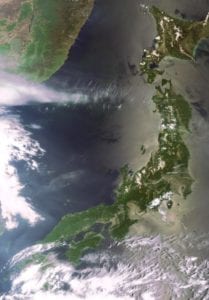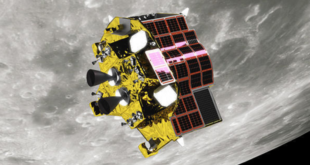
On 5 and 6 October 2019 in Kyoto, Japan, Centre national d’études spatiales (CNES) President Jean-Yves Le Gall took part in the Science and Technology in Society (STS) forum 2019 and the 10th EU-Japan Science Policy Forum. On the sidelines of these events, he met Koji Omi, the President and founder of STS, to discuss space cooperation between the two nations.
The STS forum, opened by the Japanese Prime Minister, is held every year in Kyoto, bringing together some 1,400 attendees from 80 countries. Speakers from the worlds of industry, research and politics debate topics related to the advancement of science and technologies, and their impact on our societies. CNES’s President spoke about the importance of space technologies in tackling climate change, analysing its consequences and devising coping strategies. To ensure informed and coordinated decision-making at local and global scales, be it to mitigate or adapt to climate change, it is vital to share a common diagnosis at international level. Satellites are the most effective tools in this respect, and space agencies share a special responsibility in the fight against climate change.
The Space Climate Observatory (SCO) is an international initiative backed by the world’s space nations that is geared towards responding to the challenge of climate change. The SCO will produce and disseminate relevant, timely and reliable data and information on climate change effects at national and regional levels, providing decision-makers with scenarios to inform mitigation and coping measures. It will complement and extend existing initiatives. Like satellites, efforts to curb climate change must know no bounds.
During the 10th EU-Japan Science Policy Forum, Jean-Yves Le Gall underlined Europe’s intention to remain a pivotal player in all strategic areas of space, assuring an independent launch capability, pursuing ambitious science missions and maintaining its autonomy in navigation and Earth observation. The unprecedented budget proposal of €16 billion under the next EU Multiannual Financial Framework for 2021-2027 matches these ambitions.
In a fast-moving sector where new space powers are now emerging and private players are spawning a new ecosystem, Europe and Japan can share a common space policy vision. This vision will involve leveraging the link between space and security (but without ‘militarizing’ space), developing space applications to serve citizens, fuelling new markets while improving the quality of our daily lives and pursuing the ambition to tackle climate change from space at the highest levels.





